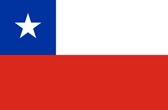
Call 0330 880 3600 Calls may be monitored or recorded. Opening Times.
- TRAVEL INSURANCE
- COVID-19 COVER
- More Options
- Help & Advice
- Existing Customers

Call 0330 880 3600 Calls may be monitored or recorded. Opening Times.

Need help?
UK Customer Services0330 880 3600*
Open Monday to Friday 9:00am to 6pm, Saturday 8:30am to 4pm and closed Sundays.
*Calls are recorded for training and quality purposes.

Official name: Republic of Chile
Capital city: Santiago
Official language: Spanish
Population: Around 19.9 million
Currency: Chilean peso (CLP)
Time zone: GMT-3
Driving side: Right
Climate: Arid desert in the north, Mediterranean in central regions, rainy and cool in the south, and cold with glaciers and tundra in the far south
Chile stretches down the western edge of South America, bordered by the Pacific Ocean to the west and the Andes Mountains to the east. Known for its striking geography, the country spans the world’s driest desert, fertile wine valleys, bustling cities, and the windswept wilds of Patagonia. Santiago, the capital, is a modern hub surrounded by mountains, while Valparaíso charms with its colourful hills and seafaring heritage. Chile also boasts world-renowned wines, vibrant culture, and a stable economy that make it one of South America’s most accessible destinations.
Chile shares borders with Argentina, Bolivia, and Peru. Its unique shape stretches over 4,300 kilometres north to south, while averaging only 180 kilometres east to west. The north is dominated by the Atacama Desert, one of the driest places on Earth, while the central region has fertile valleys and a Mediterranean climate. Further south, forests, fjords, and glaciers characterise Patagonia and Tierra del Fuego. The country’s highest point is Nevado Ojos del Salado, a volcano reaching 6,880 metres, while its extensive Pacific coastline is prone to earthquakes and tsunamis due to tectonic activity.
Chile is well connected internationally through Santiago’s Arturo Merino Benítez International Airport, with additional airports serving regional hubs such as Antofagasta, Puerto Montt, and Punta Arenas. The country has a reliable domestic flight network, necessary given the long distances between north and south. Roads are generally good, with modern highways linking major cities, but remote areas may be accessible only by smaller roads or ferry. Tourism is diverse: the Atacama Desert offers stargazing and salt flats, central Chile is known for wine tourism, and Patagonia is famous for trekking in Torres del Paine National Park. Earthquakes and volcanic activity are natural risks that visitors should be aware of.
British nationals and citizens of many other countries do not need a visa for short stays of up to 90 days. A valid passport is required, and proof of onward or return travel may be requested. Stays beyond 90 days require a visa or permit arranged with Chilean immigration authorities. The Chilean Embassy in London and the British Embassy in Santiago provide consular services for travellers.
The official currency is the Chilean peso (CLP). Credit and debit cards are widely accepted in cities and tourist areas, and ATMs are common. Casas de Cambio and banks handle foreign exchange, though it is advisable to carry some cash, especially when travelling to rural areas. Chile is relatively affordable compared to Western Europe, though costs are higher in Santiago and in remote regions such as Patagonia. Tipping around 10% is customary in restaurants.
Medical care in Chile is generally of good standard, particularly in Santiago and larger cities, though rural areas have more limited facilities. Travellers are advised to have comprehensive travel insurance, as treatment is not free. Tap water is safe to drink in Santiago but may cause stomach upset for new visitors; bottled water is recommended in other regions. No vaccinations are required for entry, but routine immunisations should be up to date, and vaccines for hepatitis A and typhoid are recommended. Chile experiences occasional outbreaks of hantavirus in rural areas of the south, and air pollution in Santiago can cause respiratory issues.